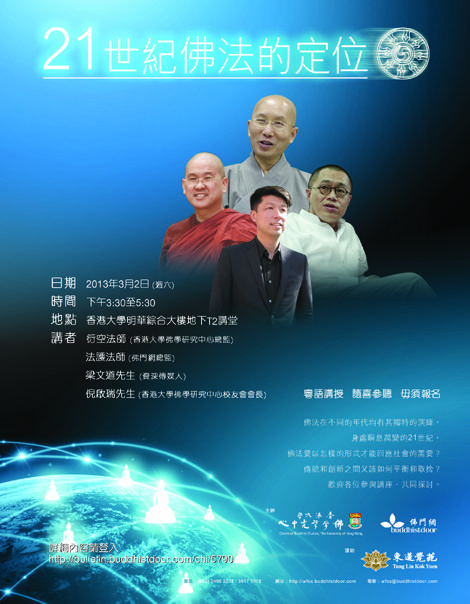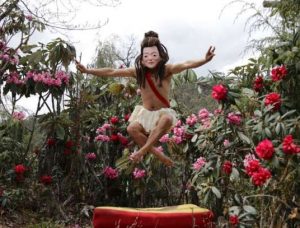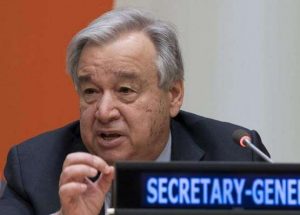In a recent Hong Kong University seminar titled “Buddhism’s position in the 21st Century” (?G???@?@?????k???w??), Ven. Hin Hung and his guests (Ven. Dhammapala, author Leung Man Tao, and upasako Walter Ngai) delineated eloquently what Buddhism needs to do in order to persist into the 21st century. But Ven. Hin Hung’s ambition goes far beyond merely delaying the disappearance of the Dharma and Maitreya’s arrival. Just as each geographic region and historical period has had its own unique Buddhist culture, he believes that this era cries out for a 21st Century Buddhism, a theological policy that provided the motivation for Saturday’s forum.
We believe that Ven. Hin Hung has the traditionalist but modernizing attitude that is crucial to guiding Buddhism into a rapidly changing world. Thanks to his commitment to his vocation as a Chinese Buddhist monastic, we are confident Ven. Hin Hung will stand firm on issues of doctrinal and Vinaya purity, imbuing him with the moral and spiritual authority he needs to lead a younger generation of 21st Century Buddhists. But if 21st Century Buddhism is to be more than a vague catchphrase, we believe there are three ideas Ven. Hin Hung needs to urgently apply. Some of these he has already set out to do, and he also mentioned them in the seminar. Our suggestion is that these points become components of a comprehensive strategy for 21st Century Buddhism: 1. Help prospective Buddhists leave behind cultural baggage. Through little fault of their own, at least two to three generations of Hong Kong and Chinese people have grown up with a distorted and unfair image of what Buddhism means. Rather than compassionate action and meditative calm, the word Buddhism is more likely to invoke images of choking incense and smoky shrines at crowded temples. At worst, these old-school constructions of Buddhism (partly facilitated by the practice of older generations) have led younger people to see Buddhism as outdated and superstitious rather than ancient and venerable, dry rather than deeply philosophical, and quietist rather than compassionate.
Ven. Hin Hung will have the difficult but important job of not only sweeping away these stereotypes, but also ensuring that Chinese Buddhism’s traditions are respected and protected as a vital part of its heritage and history.
2. Pour financial and human resources into involving the younger generation in modern Dharma activities. One could not help noticing that most of the attendees at Saturday’s forum were either middle-aged or elderly. While this is no indictment of any older generation, it is critical to rebalance the demographics towards a younger majority, especially for young people who wish to become Buddhists but feel isolated or awkward if they publicly profess their belief (this is intimately linked to our first suggestion). If investing education in our young is true, then investing Dharma in our young should be an even more urgent priority. Young people must, in Ven. Dhammapala’s words, proclaim their Buddhism as proudly as the Buddha’s lion’s roar.
3. Rebuild provincial Buddhist associations. It is, of course, laudable that global Buddhist foundations can make a difference. And indeed, it may seem to many that larger Buddhist establishments are growing and confident in their influence. However, the lesson of medieval Nalanda, Takshashila and other super-monasteries must not be forgotten. These super-monasteries were glorious institutions, but they did not outlast the near-extinction of Buddhism in India. They were in fact evidence of a shrinking Buddhist population: as Indian Buddhists dwindled in number, monks sought refuge in these fortresses to feel safe. This haunting historical lesson should teach us that small, provincial localities are where Buddhists form communities of practice and friendship. It is encouraging to see these communities growing in the West. Grassroots Buddhists are the lifeblood of a healthy 21st Century Buddhism.
What Ven. Hin Hung needs from all Buddhists is a single-minded devotion and passion to focus on the things that will craft a legitimate 21st Century Buddhism. His vision is quite radical and possibly beyond the wildest dreams of other ambitious teachers: for him, 21st Century Buddhism is not only a new stage in Buddhism’s history, but a Vehicle unto itself, just as Theravada, Mahayana, and Vajrayana were. The 21st Century is seeing the turning of the Cyber Vehicle, the Cyber-yana, and Ven. Hin Hung is one monk who can steward it.
















